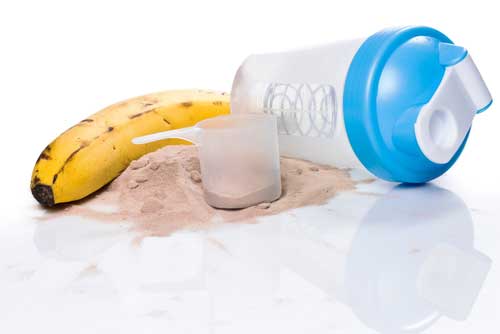You exercise hard, but how much energy do you devote to pre and post-workout nutrition meals? When and what you eat and drink directly impacts exercise performance, how pleasant or unpleasant a workout is and how you feel afterward. When you aren’t properly fueled, it’s hard to put forth your best effort. Plus, you’ll feel wiped out after you finish. Some people are proponents of fasted cardio as a way to boost fat burning, but this approach can limit the intensity of your workout. If you plan on doing a high-intensity workout, like interval training, you’ll perform better if you have fuel on board beforehand.
Timing Pre-Workout Meals and Snacks
You might think eating a meal or snack an hour before a workout is enough to fuel your muscles. Not so. Eating an hour beforehand will help prevent a drop in blood sugar but it won’t significantly increase your muscle glycogen stores. To do that, you need to eat healthy carbs on a consistent basis since it takes time for dietary carbohydrates to be stored as glycogen. Sports nutrition isn’t only about what you eat before a workout but what you eat and drink regularly.
The purpose of eating a few hours before a workout is to stabilize your blood sugar and keep it from dropping during exercise. Cells suck up a lot of glucose when you’re doing an intense workout. Choose healthy carb sources that are slowly digested and absorbed like oatmeal, lentils or fruit rather than rapidly absorbed ones like a bagel or a sugary snack bar. Slowly absorbed carbs, with a low glycemic index, will give you a more sustained source of energy rather than quickly raising your blood sugar and dropping it. If your blood sugar drops even slightly during a workout, it can reduce your exercise performance and mental focus.
Add a source of protein to your pre-workout snack. Protein helps to modify the rise in blood sugar that comes from consuming carbs and helps you avoid blood sugar crashes. Plus, protein helps protect your hard-earned muscle by reducing the catabolic effects of exercise. A good ratio of carbs to protein pre-workout is about 3 to 1.
Avoid foods that are high in fat, even healthy fats. Fat slows down stomach emptying and can make you feel “heavy,” full or bloated during and after a workout. Resist the urge to eat too close to workout time or eat too much. Most people do fine with a snack an hour before a workout, but if you plan on eating a full meal, give yourself 2 or 3 hours for digestion prior to exercising, especially if you’re doing a high-intensity workout. High-intensity workouts and a full stomach don’t mix.
Post-Workout Nutrition Meals
After a workout, focus on replenishing muscle glycogen stores and speeding up recovery. To replenish glycogen, most experts recommend taking in 1.5 grams of carbohydrates per kilogram of body weight within 30 minutes of a workout. You can consume this amount over a few hours rather than at a single meal to help keep your blood sugar level stable but begin refueling after your workout ends. This is the best time to treat yourself to a rapidly absorbed carbohydrate source since your muscles are depleted of glycogen and need replenishment.
Combine a carb snack with a source of protein. After a strength-training workout, there’s a window period during which your muscles are primed to use protein to build lean muscle tissue. Optimize after-workout muscle protein synthesis and recovery by refueling with protein and carbs within 30 minutes of a workout.
Ideas for Healthy Pre and Post-Workout Meals
Low-fat cottage cheese and fruit
Cup of plain yogurt with sliced fruit
Half of a turkey sandwich
Veggie Omelet
Greek yogurt and fruit smoothie
Multi-grain crackers with almond butter
If you’re eating an hour before a workout, keep your portion sizes small to avoid digestive upset and make sure your post-workout snack is a full meal. Skip the processed nutrition bars and fuel up with whole foods instead.
Don’t Forget about the Importance of Hydration
Although this article covers post-workout meals and snacks, hydration is just as important, if not more so. Working out in even a mildly dehydrated state (as little as 3%) makes exercise feel harder and reduces both aerobic and resistance training performance. Plus, you’re at greater risk for problems like heat exhaustion, heat stroke, and muscle cramps. Once you feel thirsty, you’re already mildly dehydrated.
To stay hydrated, drink at least 16 ounces of fluid 30 minutes prior to your workout. During your workout, consume 8 ounces of fluid every 20 minutes. Once you’ve finished, focus on replacing any fluid deficits. The best way to do this is to weigh yourself before and after a workout. For every pound of body weight, you’re down after exercising, drink 24 ounces of fluid.
Water is a suitable hydration beverage unless you’re doing a prolonged workout. For workouts longer than 90 minutes, drink an electrolyte-rich beverage, especially if you’re working out in a hot environment. Coconut water is a good alternative to a sports drink.
The Bottom Line?
It’s not just the exercises you do that determine your fitness level and body composition, nutrition counts too. You’ll perform better if you fuel up before your workout begins and again after you finish and maximize the benefits you get.
References:
Utah State Office of Education. “Sports Nutrition – Unit 5”
Total Wellness Consulting. “New Study Shows That Dehydration is Detrimental to Resistance Exercise Adaptations” July 23, 2008.
“The Effects of Hydration on Athletic Performance.” Meredith Decker. The California University of Pennsylvania.
Related Articles By Cathe:
4 Things You Need for a Successful Exercise Recovery
Refueling After a Workout: Your Muscles Are Screaming for Glycogen
How Much Glycogen Can Your Body Store?
The Role Nutrition Plays in Workout Recovery
Weight Training: Does Hydration Affect How Strong You Are?
What Type of Protein Keeps You Full the Longest?


